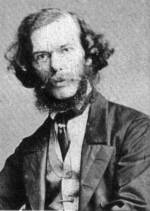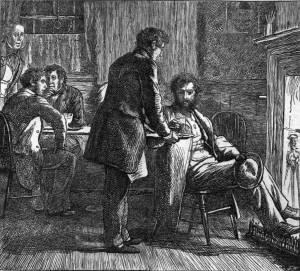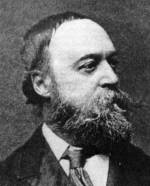Featured Author
(Edward) Dutton Cook (1829-1883)
Edward Dutton Cook was born on 30th January, 1829 in the St Pancras district of London. His father, George, originally from Grantham in Lincolnshire, was a successful solicitor.
Dutton was educated at King's College School, London and then started his working life articled to his father. After four years there he obtained a situation in the London office of a railway company. The office life did not suit him, however, and he decided to study painting and learn engraving such that at one time he sought employment on Punch as a draughtsman in wood. However, he was ultimately unsuccessful and turned to literature instead, collaborating with fellow solicitor, Leopold Lewis on the melodrama, The Dove and the Serpent which was produced very successfully at the City of London Theatre. For relaxation he joined the Artists' Rifle Corps and the Ramblers' Club, the latter meeting every night from November to May at Dick's Tavern in Fleet Street.
 From 1867 to 1875, he was drama critic of the Pall Mall Gazette, and was on the editorial board of the Cornhill Magazine between 1868 and 1871. He also seems to have helped Anthony Trollope out in his foray into publishing. In 1867, the publisher, James Virtue in collaboration with Trollope set up the St Paul's Magazine. Anthony only edited the magazine for three years, and the venture was not a success. Nevertheless, in his autobiography, he talks of "obtaining the services of an excellent literary corps", including, among others, Leslie Stephen, Mrs Lynn Linton, G H Lewes (see picture), George MacDonald, Mrs Oliphant, and Dutton Cook.
From 1867 to 1875, he was drama critic of the Pall Mall Gazette, and was on the editorial board of the Cornhill Magazine between 1868 and 1871. He also seems to have helped Anthony Trollope out in his foray into publishing. In 1867, the publisher, James Virtue in collaboration with Trollope set up the St Paul's Magazine. Anthony only edited the magazine for three years, and the venture was not a success. Nevertheless, in his autobiography, he talks of "obtaining the services of an excellent literary corps", including, among others, Leslie Stephen, Mrs Lynn Linton, G H Lewes (see picture), George MacDonald, Mrs Oliphant, and Dutton Cook.
In 1875 Cook left the Pall Mall Gazette for the World magazine, where he remained as drama critic until his death, continuing to build on his reputation as one of the ablest, but also one of the most difficult critics to please.
 During his writing career Dutton Cook contributed to the Dictionary of National Biography, wrote books on art and the theatre and published articles in a number of periodicals. At least two pieces were published in the Belgravia magazine, Suit the Action to the Word, which discusses the difficulty a performer faces when deciding how much or how little gesticulation is required on stage, and Strange Players, a humorous piece containing anecdotes of actors who have become insane yet still turned in great performances and those who have acted despite being deaf, blind and having missing limbs. His two major works on the theatre were, A Book of the Play:studies and illustrations of histrionic story, life, and character, and Hours with the Players.
During his writing career Dutton Cook contributed to the Dictionary of National Biography, wrote books on art and the theatre and published articles in a number of periodicals. At least two pieces were published in the Belgravia magazine, Suit the Action to the Word, which discusses the difficulty a performer faces when deciding how much or how little gesticulation is required on stage, and Strange Players, a humorous piece containing anecdotes of actors who have become insane yet still turned in great performances and those who have acted despite being deaf, blind and having missing limbs. His two major works on the theatre were, A Book of the Play:studies and illustrations of histrionic story, life, and character, and Hours with the Players.
His best known novel, Paul Foster's Daughter, a tale of Bohemian London, was published in 1861. The eponymous hero is "a historical painter, an unsuccessful great man. Perhaps on reflection we had better say, simply, unsuccessful." Other novels included, Leo, a story of the London art world, Doubleday's Children, a family saga, and The Prodigal Son (1862), a tale of passions, betrayal and bigamy, a very fashionable theme of the time, this novel being produced in the same year as the vastly more popular "bigamy novel", Lady Audley's Secret by M E Braddon.
In 1874, while in his mid-forties, he had married Linda Scates whom he met at Charles Dickens' house, Gad's Hill. She was a pupil at the Royal Academy of Music and became a well known pianist. Their daughter, Sylvia was named after the heroine of Cook's first novel. However, he did not live to see her grow to adulthood as he died suddenly of heart disease in London on the 11th September, 1883. He is buried in Highgate Cemetery.
With especial thanks to my mum for researching the Census information
Biographical Bibliography
- Gasson, A. Wilkie Collins: an illustrated guide. Oxford: Oxford University Press, 1998
- http://85.1911encyclopedia.org/C/CO/COOK EDWARD DUTTON.htm
- http://etext.library.adeaide.edu.au/t/trollope/anthony/autobiography/chapter15.html
- http://www.oakknoll.com/detail.php?d booknr=87481&d currency=
- Kilgarriff, M. The Golden Age of Melodrama: twelve 19th century melodramas. London: Wolfe Publishing Limited, 1974
- Scott, C. The Drama of Yesterday and Today, Volumes I and II. London: Macmillan & Co. Ltd, 1899
- Sutherland, J. The Longman Companion to Victorian Fiction. Singapore: Longman, 1990.
Here are a few quotes from Dutton Cook's The Prodigal Son
 The opening...
The opening...
Would he live through the night? Would he die before his eldest son arrived? Could it be that the parent and the child, separated since so many years, were not to meet again on this side of the grave?...
Cook on women and the sickroom...
Have not sickness and suffering some kind of fascination for women? Is there not in these truly an "open sesame" to their hearts? But I fancy - may I so state without being deemed rude? - that women are always partial to anomalies, and that the combination of sovereignty and servitude involved in the act of nursing somehow particularly recommends it to their not too logical minds. Is a male writer to discuss such a question?...
The "hero" on discovering his first wife is still alive...
"I thought you were dead."
She glanced at him reproachfully.
"You hoped so, perhaps?" But he made no answer. She went on passionately in her foreign manner."Well! and why not? Why should you not hope me to be dead? wish for me to be dead? You cannot have hoped it - prayed for it - more than I have. I should have killed myself a thousand times, but that I am a woman! a fool! a coward! and I shrunk and shivered and fainted, and I did not dare! What have I ever done that you, that anyone, should wish me living? Nothing! nothing!..."
The "hero's" friend advises him after being told of the bigamous marriage...
"Violet is not your wife. You are guilty of a deliberate crime if you now try to trick her into the belief that she is; if you ask her any more to regard you as her husband. Let the truth be told: - there will be sorrow, but there will be no sin; there will be cause for her anger - none for her contempt. You are a gentleman - a Hadfield. Be just and fear not. You will part from her for ever. You will have wronged her cruelly, but she is a woman - she loves you - she will pardon you."
"It will kill her!"
"But she will die with a prayer for you upon her lips."
"And our child?"
"It is hers; do not think to part her from it. She will love you through her child. If she sinks down under this great trial, she will bequeath to you the care of her child - a sacred trust - which you will, I am sure, Wilford, respect as it merits. For the rest you must trust to Heaven. You will have made all the atonement that is possible."
Here are a few quotes from Dutton Cook's reviews of plays
On Mr John S Clarke's performance as Tyke in Morton's play, The School of Reform:"He earned the applause of the audience. He has fairly mastered the country dialect of the part, and avails himself skilfully of the opportunities for dramatic display it affords. In the situations of the comedy that most trench upon melodrama he was occasionally very powerful."
Generally Dutton Cook was dismissive of Wilkie Collins' plays and Rank and Riches: A Play in Four Acts and Five Tableaux was no exception:"[the play] by no means contented the audience...on such occasions there are always wilder spirits present who stay to ridicule what they came to enjoy..."
 Commenting abrasively upon W G Wills' play, Eugene Aram which the latter claimed was based on "tradition" rather than on Tom Hood's famous poem or Lord Lytton's novel.
Commenting abrasively upon W G Wills' play, Eugene Aram which the latter claimed was based on "tradition" rather than on Tom Hood's famous poem or Lord Lytton's novel."With Lord Lytton, Mr Wills [see picture] has ignored the circumstance that Aram, who was fifty-five at the date of his death, left behind him a wife and a family of three sons and three daughters; and the dramatist, with even less adherence to the truth than the novelist, has dispensed with the trial and execution of his criminal-hero, and permitted him to escape at last almost unpunished and undisgraced."
To be fair to Wills, in his version Aram does die of remorse in great agony of mind just as he is about to be married, declaring:
Oh! My lost love, on me be all the stain;
On me the judgement and the penalty...
Let not God's hand, which presses upon me,
Crush, with the guilty, the poor innocent.
Go in, go in, and leave me...
Great God! This moment I can hear his cry
And see the wild quenched gaze he fixed on me...
My sin has found me! My tale is done,
And the cold strikes my heart...You shrink from me...
Incidentally...
Dutton Cook's library was auctioned at Sothebys on July 1st, 1884. It consisted of 413 lots.
I would love to read the short story Patty by Dutton Cook
I would love to read an essay by him called, "The Pupil of Sir Thomas Lawrence"
Click here to see a list of his works
HOME
See other featured authors: Mrs George Linnaeus Banks, Sir Walter Besant, Rosa Nouchette Carey, Dinah Craik, Sarah Doudney, Ellen Thorneycroft Fowler, Mary E Hullah, Edna Lyall, Isabella Fyvie Mayo, William Edward Norris, GB Stuart, CEC Weigall.
 From 1867 to 1875, he was drama critic of the Pall Mall Gazette, and was on the editorial board of the Cornhill Magazine between 1868 and 1871. He also seems to have helped Anthony Trollope out in his foray into publishing. In 1867, the publisher, James Virtue in collaboration with Trollope set up the St Paul's Magazine. Anthony only edited the magazine for three years, and the venture was not a success. Nevertheless, in his autobiography, he talks of "obtaining the services of an excellent literary corps", including, among others, Leslie Stephen, Mrs Lynn Linton, G H Lewes (see picture), George MacDonald, Mrs Oliphant, and Dutton Cook.
From 1867 to 1875, he was drama critic of the Pall Mall Gazette, and was on the editorial board of the Cornhill Magazine between 1868 and 1871. He also seems to have helped Anthony Trollope out in his foray into publishing. In 1867, the publisher, James Virtue in collaboration with Trollope set up the St Paul's Magazine. Anthony only edited the magazine for three years, and the venture was not a success. Nevertheless, in his autobiography, he talks of "obtaining the services of an excellent literary corps", including, among others, Leslie Stephen, Mrs Lynn Linton, G H Lewes (see picture), George MacDonald, Mrs Oliphant, and Dutton Cook. During his writing career Dutton Cook contributed to the Dictionary of National Biography, wrote books on art and the theatre and published articles in a number of periodicals. At least two pieces were published in the
During his writing career Dutton Cook contributed to the Dictionary of National Biography, wrote books on art and the theatre and published articles in a number of periodicals. At least two pieces were published in the  The opening...
The opening... Commenting abrasively upon W G Wills' play, Eugene Aram which the latter claimed was based on "tradition" rather than on Tom Hood's famous poem or Lord Lytton's novel.
Commenting abrasively upon W G Wills' play, Eugene Aram which the latter claimed was based on "tradition" rather than on Tom Hood's famous poem or Lord Lytton's novel.